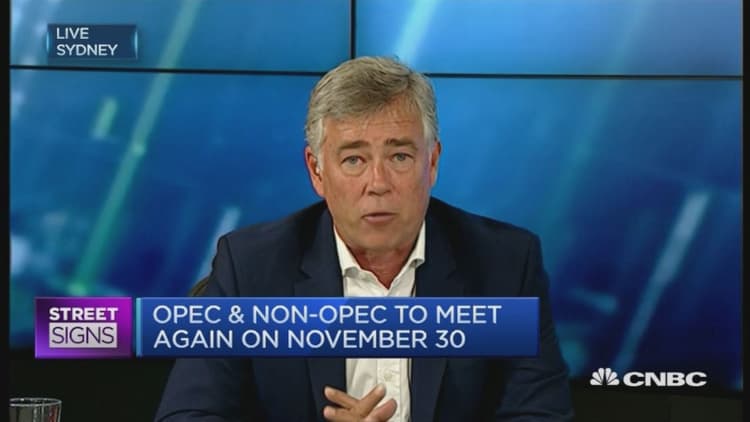Oil prices dropped more than 3 percent on Monday to touch a one-month low on doubts about OPEC's ability to implement its planned production cut, even as cartel officials approved a document outlining their long-term strategy.
Officials from the Organization of the Petroleum Exporting Countries (OPEC) approved the document on Monday in a sign its members are achieving a consensus on managing production.
But OPEC has so far achieved little otherwise. Cartel representatives met on Friday in Vienna, and then again on Saturday with their counterparts from non-member producers. They did not reach any specific terms, and Iran has been reluctant to even freeze its output, sources said.
"The market is becoming a bit weary," said Kyle Cooper, analyst at ION Energy in Houston. "Unless OPEC can circle the wagons and get everyone on the same page, the market's going to be skeptical."


U.S. West Texas Intermediate (WTI) crude for December settled down $1.84, or 3.8 percent, at $46.86, the lowest close since Sept. 27.
International benchmark Brent crude's front-month contract, which expires after Monday's session, was down $1.39, or 2.8 percent, at $48.32 a barrel by 2:37 p.m. ET (1837 GMT). It fell as low as $47.98 in intraday trading, the weakest price since Sept. 28.
The more active next-month Brent contracts were down $2.02, or 4 percent, at $48.66 a barrel.
Reservations over OPEC's output cut prompted analysts to leave their price outlooks broadly unchanged, a Reuters poll on Monday showed.
"It's a continued readjustment to the fact that OPEC still cannot agree to a number," PetroMatrix managing director Olivier Jakob said of OPEC's failed efforts last week to agree how to put in place a deal to make modest cuts in order to limit output to 32.5 to 33 million barrels per day (bpd).
"There was a lot of talk and nobody managed to agree on anything. That has been pushing the market down," said Jeffrey Halley, senior market analyst at OANDA brokerage in Singapore.
The potential tightening of the U.S. presidential race after news of a renewed FBI probe of Democratic candidate Hilary Clinton was also affecting sentiment and putting investors off riskier assets, Halley said.


Compounding the bearish sentiment was data from energy monitoring service Genscape, cited by traders, which showed a build of 585,217 barrels of crude at the storage hub and delivery point for WTI futures in Cushing in the week to Oct. 28.
Global oil prices have risen by as much as 13 percent, encouraging a recovery in the industry after OPEC announced on Sept. 27 a production cut to boost prices after a slump that began mid-2014.
But General Electric, which announced on Monday it would merge its oil-and-gas business with Baker Hughes, said the move assumes a "slow" oil price recovery.
A representative for oil transport company Euronav NV said on Monday it is unlikely that OPEC will push up prices due to Iran and Iraq, which has also resisted cuts.
OPEC had not specified how much each individual member should cut, saying that will be finalized at the Nov. 30 meeting.
Asian imports of Iranian crude oil jumped by 70 percent in September on the year, a sign of its growing market share.
Russia expects to increase its oil output by 0.7 percent next year and a further 0.9 percent in 2018, the draft federal budget showed. Russia also expects crude production to hit a record-high 548 million tonnes in 2017, up from an estimated 544 million tonnes this year.
In another bearish sign, money managers cut their net long U.S. crude futures and options positions for the first time in five weeks in the week ended Oct. 25, the U.S. Commodity Futures Trading Commission (CFTC) said on Friday.
— CNBC's Tom DiChristopher contributed to this report.

